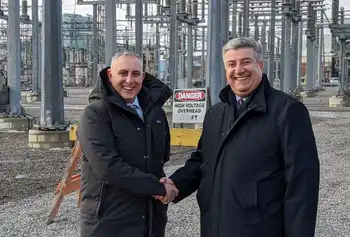New York official opposes hydroelectricity deal
ALBANY, N.Y. - Assembly Speaker Sheldon Silver is behind efforts to stymie legislation that would preserve for north country businesses hydroelectricity produced at the St. Lawrence-FDR Power Plant, according to knowledgeable sources who asked not to be identified.
The state Senate last year approved a measure that would have preserved 490 megawatts of replacement power for businesses within 60 miles of the St. Lawrence-FDR project and 445 megawatts for businesses within 30 miles of the Niagara Power Project. The measure stalled in the Assembly.
What the Assembly did approve, however, was a measure that would have preserved only the Niagara power. Legislation introduced by Assemblyman Darrel J. Aubertine, D-Cape Vincent, never made it out of committee.
State Sen. James W. Wright, R-Watertown, using his influence as chairman of the Senate Energy and Telecommunications Committee, was able to prevent the Assembly's Niagara power bill from coming to a floor vote.
Mr. Wright was joined in his efforts by state Sen. Dale M. Volker, R-Depew, a former chairman of Mr. Wright's committee. As a result, Mr. Volker suffered harsh criticism from state lawmakers and the media in Western New York, who also accused Mr. Wright of meddling with the legislative process.
"Could I have run over the top of Jim to do our piece of the replacement power? Yeah, because I have seniority," Mr. Volker said. "But I don't see, and we talked about this at great length, I don't see our power at great danger.
" Other Western New York lawmakers, most notably Assembly Majority Leader Paul A. Tokasz, D-Cheektowaga, claimed there was no reason to pair the projects in a single piece of legislation because they had nothing in common and the Niagara power faced time pressure because of the project's upcoming relicensing, which has to be completed in 2007.
Mr. Wright and Mr. Volker strongly disagreed with both arguments, saying the two projects are so alike that it's just common sense to have a single measure that covers both. And the time pressure argument is baseless, they said.
Mr. Tokasz claims that dozens of Western New York businesses that have contracts with the New York Power Authority will see those pacts expire by 2007 and that those businesses need to know right now whether that low-cost electricity will continue to be available to them.
However, agreements reached with former NYPA President and CEO S. David Freeman extends 56 contracts for 39 customers who are getting the hydropower, representing the vast majority of such contracts.
While no contracts have been formally extended, if the Niagara project is relicensed and nothing in the relicensing prohibits it, the contracts should be extended, said John L. Murphy, a NYPA spokesman.
"But I'm not going to speculate on what the Federal Energy Regulatory Commission is going to say in our license," Mr. Murphy said. "I'm not going to speculate on the future of the contracts."
For their part, the Western New York businesses that would be affected most by the legislation don't care how the legislation gets passed, just that it gets done, and the sooner the better.
"We don't care if it ties the two projects together or it's done separate," said Kelly A. Brannen, chairman of Power for Economic Prosperity, which represents 22 large manufacturers that are longtime users of Niagara Power Project electricity. "We recognize the issues for Watertown and the area; we recognize that their power needs to be protected as well."
His group's businesses are just as frustrated as north country stakeholders over the lack of success in getting legislation approved, said Mr. Brannen, who also is managing director of Niacet Corp., Niagara Falls.
The Western New York lawmakers should be willing to compromise and negotiate with the north country legislators to get something in place that benefits both regions, Mr. Brannen said.
"We want to get that legislation passed," he said. "Whatever needs to get done to get that passed, we don't care."
What is really happening is, for want of a better term, a power grab by downstate lawmakers eager to get some of the St. Lawrence- FDR hydroelectricity, Mr. Volker said.
"Paul Tonko is chairman of the Energy Committee in the Assembly and he wants some of that power for his region," Mr. Volker said. "Most in the Assembly are from New York City and they want that power for themselves."
However, Mr. Tonko, D-Amsterdam, could not make such a play without strong support, which is just what he is receiving from Mr. Silver, a Manhattan Democrat. As a smokescreen, however, they have recruited an unwitting ally: Mr. Aubertine, even going so far as having the Assembly speaker's staff write the measure the north country legislator introduced to protect the St. Lawrence power.
Mr. Aubertine and Mr. Silver did not return repeated phone calls seeking comment.
Mr. Aubertine actually introduced two measures, putting the first on hold because of what he called technical problems, and submitting a second bill that preserves the St. Lawrence-FDR hydropower for businesses in Jefferson and St. Lawrence counties. However, that measure left out Franklin County, a point not lost on Assemblyman G. Christian Ortloff, R-Plattsburgh.
"Franklin County has more of a claim to it than Jefferson," Mr. Ortloff said.
The issue boils down to downstate lawmakers, specifically those from New York City, trying to ram through legislation that benefits their interests while ignoring the north country's needs and using a northern New York legislator as camouflage for their actions, Mr. Ortloff said.
Mr. Silver used similar tactics in pushing through legislation approving the gaming compact with the St. Regis Mohawk Tribe that allowed the operation of the Akwesasne Casino while doing nothing to address land-claims or sales-tax issues. Mr. Silver wanted to clear the way to establish an Indian casino in the Catskills, Mr. Ortloff said.
"I like Darrel, but he's in a very difficult position and, if he's not careful, it'll happen again," Mr. Ortloff said.
If necessary, he will introduce his own legislation that matches the bill Mr. Wright and Mr. Volker co-sponsored that would preserve the hydropower from both plants for their respective regions, Mr. Ortloff said.
"I'd be happy to do a St. Lawrence-Niagara protection bill in early January," he said.
Mr. Volker plans to push forward his legislation this month, as early in the new legislative session as possible.
" I think we're going to come to a compromise because, now that the election's over and the Senate and Assembly are discussing things more easily, I do believe early on we'll get this out of way," he said.
Mr. Wright agrees and added that he has obtained the full support of Senate Majority Leader Joseph L. Bruno, R-Brunswick, in taking whatever action is necessary to see that the St. Lawrence and Niagara legislation is approved together.
Mr. Wright has vowed to use his position as Energy chairman to block any effort to move the Niagara project legislation forward on its own.
"In his position as chairman, I support him on that," Mr. Bruno said before Christmas.
"It would be my intent to try to negotiate a companion bill with Buffalo, ideally in one bill," Mr. Wright said. "If that's not acceptable, we're willing to pass two bills simultaneously."
Gov. George E. Pataki would not say what sort of legislation he would support.
"We'd have to take a look at any specific proposals," said Jennifer L. Meicht, a spokeswoman for the governor's office. "The governor believes that communities in the north country and Western New York that host NYPA power projects should continue receiving the benefits of the low-cost power those projects produce."
If Mr. Silver is involved in an attempt to shift St. Lawrence- FDR hydropower to New York City, it is a bad idea and one unlikely to succeed, said Charles Komanoff, an New York City-based energy consultant.
"That's a zero-sum game, taking something that somebody else already has," Mr. Komanoff said. "I'm sure he's blustered about that, but I doubt he's gotten anywhere with that and I doubt he ever will. I'd much rather hear people talk about doing better with what they have."
Related News

Neo-Nazi, woman accused of plotting 'hate-fueled attacks' on power stations, federal complaint says
BALTIMORE - A neo-Nazi in Florida and a Maryland woman conspired to attack several electrical substations in the Baltimore area, federal officials say.
Sarah Beth Clendaniel and Brandon Clint Russell were arrested and charged in a conspiracy to disable the power grid by shooting out substations via "sniper attacks," according to a criminal complaint from the U.S. Attorney's Office for the District of Maryland.
Clendaniel allegedly said she wanted to "completely destroy this whole city" and was planning to target five substations situated in a "ring" around Baltimore, the complaint said. Russell is part of a violent extremist group that has cells…




